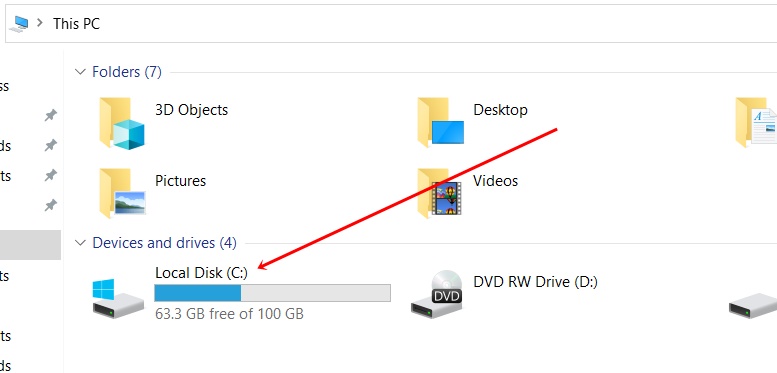- PHP Basics
- Learn PHP
- PHP Comments
- PHP Data Types
- PHP Variables
- PHP Operators
- PHP echo
- PHP print
- PHP echo vs. print
- PHP if else
- PHP switch
- PHP for Loop
- PHP while Loop
- PHP do...while Loop
- PHP foreach Loop
- PHP break and continue
- PHP exit()
- PHP exit() vs. break
- PHP isset()
- PHP Arrays
- PHP print_r()
- PHP unset()
- PHP Strings
- PHP Functions
- PHP File Handling
- PHP File Handling
- PHP Open File
- PHP Create a File
- PHP Write to File
- PHP Read File
- PHP feof()
- PHP fgetc()
- PHP fgets()
- PHP Close File
- PHP Delete File
- PHP Append to File
- PHP Copy File
- PHP file_get_contents()
- PHP file_put_contents()
- PHP file_exists()
- PHP filesize()
- PHP Rename File
- PHP fseek()
- PHP ftell()
- PHP rewind()
- PHP disk_free_space()
- PHP disk_total_space()
- PHP Create Directory
- PHP Remove Directory
- PHP Get Files/Directories
- PHP Get filename
- PHP Get Path
- PHP filemtime()
- PHP file()
- PHP include()
- PHP require()
- PHP include() vs. require()
- PHP mysqli Tutorial
- PHP mysqli Tutorial
- PHP and MySQL Setup
- PHP mysqli: Create Database
- PHP mysqli: Create Table
- PHP mysqli: Insert Record
- PHP mysqli: Update Record
- PHP mysqli: Fetch Record
- PHP mysqli: Delete Record
- PHP mysqli: SignUp Page
- PHP mysqli: LogIn Page
- PHP mysqli: Store User Data
- PHP mysqli Functions
- PHP mysqli_connect()
- PHP mysqli_close()
- PHP mysqli_connect_errno()
- PHP mysqli_connect_error()
- PHP mysqli_query()
- PHP mysqli_fetch_row()
- PHP mysqli_fetch_assoc()
- PHP mysqli_fetch_array()
- PHP mysqli_free_result()
- PHP mysqli_error()
- PHP mysqli_prepare()
- PHP mysqli_stmt_bind_param()
- PHP mysqli_stmt_execute()
- PHP mysqli_stmt_fetch()
- PHP mysqli_stmt_store_result()
- PHP mysqli_stmt_num_rows()
- PHP mysqli_stmt_bind_result()
- PHP mysqli_stmt_get_result()
- PHP mysqli_result class
- PHP mysqli_report()
- PHP error_reporting()
- PHP mysqli_real_escape_string()
- PHP htmlspecialchars()
- PHP Misc Topics
- PHP Object Oriented
- PHP new Keyword
- PHP header()
- PHP getallheaders()
- PHP Cookies
- PHP Sessions
- PHP Date and Time
- PHP GET vs. POST
- PHP File Upload
- PHP Image Processing
PHP disk_total_space(): Find total disk space
The PHP disk_total_space() function is used when we need to find the total space available on a specified disk or filesystem. The space returned using this function will be in bytes by default. For example:
<?php
$space = disk_total_space("C:");
echo $space;
?>
The output of the above PHP example on the disk_total_space() function is:

That is, 107427655680 bytes are the total space available on my C drive. Here is a snapshot of the C drive of my computer system:

Find Amount of Total Disk Space in GB using PHP
To modify the above program to print the total space available on the C drive in GB, then use the following example:
<?php
$spaceBytes = disk_total_space("C:");
$spaceKb = $spaceBytes/1024;
$spaceMb = $spaceKb/1024;
$spaceGb = $spaceMb/1024;
echo "<p>Total Space available in <b>C</b> Drive is <b>$spaceGb</b> GB</p>";
?>
Now the output should be:

To remove all digits after decimals, use (int) before $spaceGb. For example:
<?php
$spaceBytes = disk_total_space("C:");
$spaceGb = $spaceBytes/1024/1024/1024;
$spaceGb = (int)$spaceGb;
echo "<p><b>C</b> Drive Total Space = <b>$spaceGb</b> GB</p>";
?>
Now the output should be:

PHP disk_total_space() Syntax
The syntax of the disk_total_space() function in PHP is:
disk_total_space(x)
The x parameter is required and refers to the filesystem or disk whose total space we need to see.
Advantages of the disk_total_space() function in PHP
- Determining the overall size of a disk or partition is simple and can be done with a single line of code.
- It is fast because it only needs to determine the total size of the disk or partition.
- It's great for large disks or partitions because it doesn't hog a lot of memory.
- The total size of the disk or partition, including any reserved or hidden sectors, is accurately represented.
Disadvantages of the disk_total_space() function in PHP
- This function does not reveal anything about the contents of the disk or partition other than its overall size.
- If the disk or partition being checked is under the user's control, then this function may pose a security risk. This might give nefarious users access to delicate server disk or partition information.
- The behavior of this function may vary across platforms and operating systems, which may have an impact on how accurately the total size is measured.
- If the disk or partition cannot be accessed or if there are other problems with the disk or partition, this function does not provide detailed error messages.
« Previous Tutorial Next Tutorial »